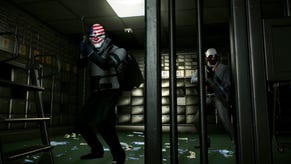Payday 2 review
Heist society.
"Warty and slightly shonky in places, but built on rock-solid foundations." That was the Eurogamer verdict on the first Payday when Rich reviewed it back in 2011, and it's a conclusion that applies equally to its sequel. Despite a couple of years to tidy things up, with help from the FPS innovators at Starbreeze, developer Overkill has delivered a game that is only slightly improved - and not always in the areas that needed it most.
As before, you and three others plunge into the Michael Mann-flavoured world of the professional thief. Select your crime, plan the best way to pull it off, then watch as your attempts to be cool, suave robbers give way to chaotic shoot-outs and desperate last-minute scrambles to the getaway car.
Those basics really haven't changed much. Missions still tend to boil down to a wave-based survival formula as you hold a position while a timer ticks upwards to 100% completion. It might be a drill boring into a safe or it might be a computer upload of data designed to smear a corrupt senator, but the mechanics settle at an identical level. Hold your ground and save your ammo as increasingly tough law enforcers are thrown at you, then leg it to the designated exit point.
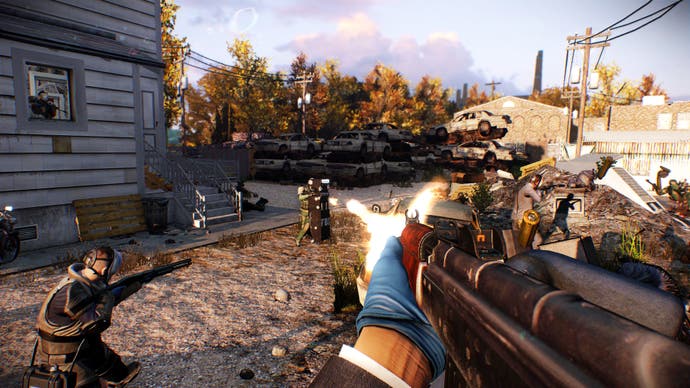
Also returning is the slightly low-rent feel, revealed through grubby textures, clumsy animations and a tendency for the screen to collapse into polygon soup whenever characters overlap with your field of vision. The AI remains distractingly dim, with friend and foe alike too often found standing around, motionless, or stuck in weird loops. Context-sensitive button prompts are skittish. Occasionally, the game just breaks, stranding you with no enemies and no loot, your getaway trapped in digital limbo.
Nor has the game world been granted any great illusion of life. One of the simplest jobs requires you to wade into a shopping mall and cause $50,000 worth of damage - an apparently easy task complicated by the fact that it's hard to see what damage, precisely, you're doing to the lifeless scenery. This is a game where you can pick the lock of a door but not close it again afterwards; where some windows break but not others; where crude invisible walls contain your criminal aspirations more thoroughly than the cops.
Where Payday 2 does innovate, the results are mostly successful. Introducing four character classes is a welcome change, as is the ability to respec your character without penalty should you wish to try something different. Masterminds specialise in crowd control, with the ability to turn unwilling hostages into ad hoc accomplices through Stockholm Syndrome. Enforcers are the tank equivalents, useful for dishing out and soaking up damage during the regular police assaults that give the game its tempo. Technicians can lay mines, plant turrets and have the best drill skills. Ghosts are the stealth operatives, better able to avoid suspicion before a job kicks off.
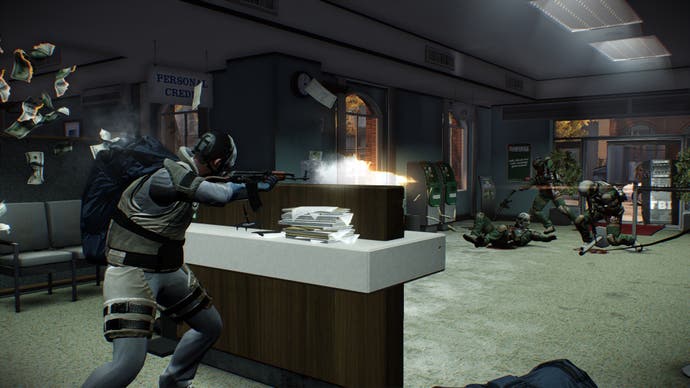
Taken together, all four form a pretty compelling criminal outfit, but the benefits aren't really apparent until much later in the game, once you've earned enough cash and XP to unlock the really interesting gadgets and talents. It's only then that Payday 2 stops being an esoteric shooter and starts to feel like a game where planning and strategy might make a difference.
Less successful is the introduction of Crime.net, a sprawling mission selection system that offers multiple versions of the same jobs across a map. Some will have higher paydays and greater risk, indicated by star ratings; some are freshly announced and ripe for someone to host; others are already populated and ready to go. To make things less clear, new jobs only stay active for a short time before vanishing.
It's all very poorly explained, and dropping the player straight from a rather thin safe house tutorial into this splurge of inexplicable icons leads to a lot of confusion. Even once you've worked out what's going on, it's still a needlessly fussy way to start a session. If you know which of the game's jobs you want to undertake, scrolling around looking for it to pop up is just an annoying hurdle.
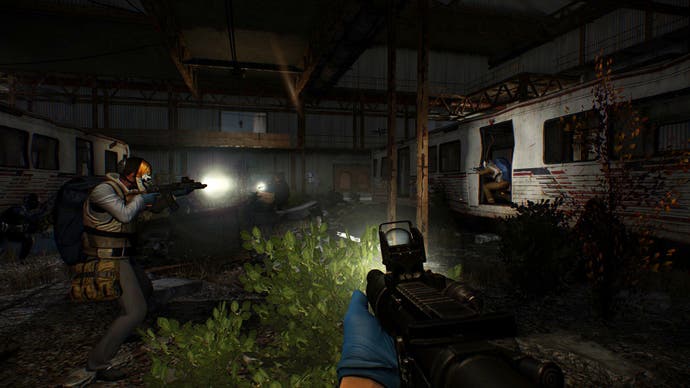
Not only are there far more jobs to take on this time, but they're more ambitious in scope, with several that spread across multiple days - or rounds, if you want to be picky. So the first day of a larger job might see you stealing paintings from a gallery. Day two has you ambushed by the cops while selling them to a sleazy politician who is unaware that you've hidden cameras in the paintings. On day three, you attack his apartment to steal his gold and smear his name. Only when all three days are done do you get paid - long-term risks for bigger rewards.
There's even a separate, offline Crime.net for those who just want to play alongside the creaky AI and see the game at its worst. No - warty and slightly shonky though it is, Payday 2 is a game that demands to be played with others. Strangers at a pinch, but preferably friends. That's when the technical hiccups and weird rules fade into the background and you're left with what is still, somewhat against the odds, one of the most f***ing awesome co-op games around.
When all its clunky gears suddenly align, the result remains phenomenal: a combination of Left 4 Dead's randomly generated mayhem and the muscular precision of a hardcore shooter
The difference between a bad Payday match and a great one is so jarring that it can give you whiplash. It takes patience and no small amount of forgiveness to help it get there, but when all its clunky gears suddenly align, the result remains phenomenal: an utterly absorbing combination of Left 4 Dead's randomly generated mayhem and the muscular precision of a hardcore shooter, topped off with the big screen frisson of being the smart-suited, fright-masked guy with the AK, ordering the hostages onto the floor or standing in the street, holding off the SWAT team in a flurry of cordite and thunder.
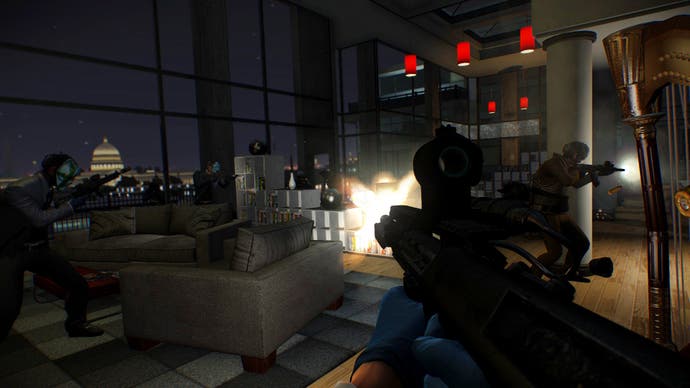
In some respects, this is the game fans were hoping for: more of the same, with more features and the greater long-term appeal of character progression. In other ways, it's a slight disappointment, a game still suffering from technical issues that should have been the first thing to be tackled. There's clearly an even better game to be made here, if Overkill could just scrape the gunk off its lumpy game engine. The same game with the environmental mayhem of the Frostbite engine, for example, would be a sight to behold.
That Payday 2 overcomes so many handicaps to emerge, once again, as a fantastically entertaining multiplayer game is a victory in itself. There's something mercurial at the heart of this series that glitches and bugs can't erase. It's still a long way from being the slick, sophisticated crime thriller it wants to be but, with a little forgiveness from the player, this rough diamond manages to shine.



